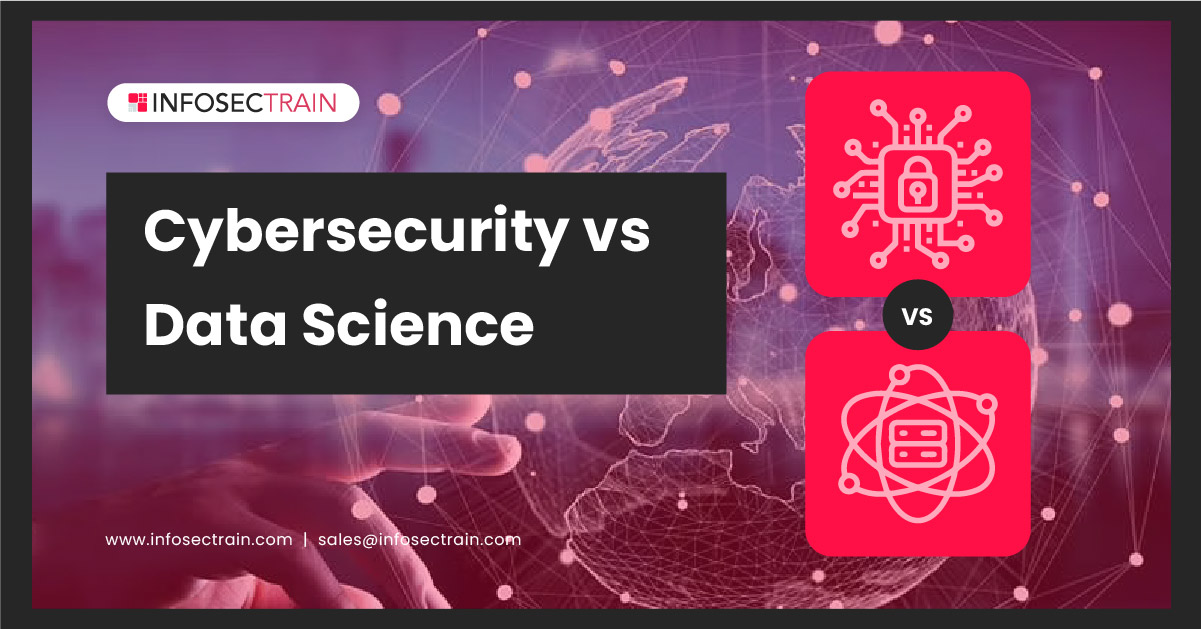Cybersecurity vs. Data Science: A Roadmap
Table of Contents
What is Cybersecurity?
Career Scope in Cybersecurity
What is Data Science?
Career Scope in Data Science
Cybersecurity vs. Data Science
Organizations seek ways to safeguard large amounts of data and use it effectively as technology evolves, especially in the workplace. Data science and cybersecurity experts are in high demand due to the rising collection of data in various sectors and the rise in cybersecurity risks. Many people upgrade their skills and focus on one of these two fields to meet this demand. But how do you decide which road to take? Before deciding on a career route, you should understand the difference between cyber security and data science.
What is Cybersecurity?
The word “cyber” means a world of computers or computer networks, and Cyber security is the practice of safeguarding electronic data systems against malicious or unauthorized activity. Cybercriminals are already too clever and may simply exploit security flaws to enter data systems. As a result, strong information security measures must be implemented to keep data safe from unauthorized access.
Cybersecurity experts have an active mind and a strong willingness to learn and develop innovative solutions. With the advancement of technology, the industry demands ongoing skill upgrades to keep up with new technology transformations.
Career Scope in Cybersecurity
Many enterprises recruit cybersecurity professionals or consultants to protect their data and systems from security attacks. Cybersecurity experts can assist firms in safeguarding confidential information that is damaged in a security breach. Every organization hires cybersecurity professionals, including banks, health, credit-card companies, e-commerce businesses, and technological organizations. Some of the jobs which cybersecurity professionals acquire:
- Cybersecurity Analyst
- Incident Responder
- Computer Forensics Analyst
- Cybersecurity Engineer
- Malware Analyst
What is Data Science?
Data science is concerned with the extraction and analysis of data to make insight into it, and it’s critical for firms to identify data-driven solutions. Data science is a set of instructions, tools, and machine learning methods that work together to find new trends in raw data. Planning, evaluating, explaining, deploying, and monitoring a model are the five phases involved in data science. A Data Scientist must have the right tools to access the relevant data, and accuracy is what matters most in deploying any models first. Evaluating the model allows the data scientist to improve it or replace it with a better one.
Career Scope in Data Science
The field of data science is growing in popularity and becoming more enticing to students, and working professionals as the demand for Data Scientists grows. Thanks to big data’s position as a different perspective engine, Data Scientists are in high demand at the organizational level across all vertical industries. Whether it’s to increase customer retention, optimize product development, or mine data for new business prospects, companies are continually relying on Data Scientist skills to stay ahead of the competition. The following are some examples of data science jobs:
- Data Scientist
- Statistician
- Data Engineer
- Product Manager
- Lead Data Scientist
Cybersecurity vs. Data Science
Cyber security entails putting in place safeguards to prevent hackers and other unauthorized individuals from accessing digital data systems.
On the other hand, data science takes a multidisciplinary approach because it does not focus solely on one position. Data Scientists integrate data collection, extraction, analysis, and manipulation to provide useful information.
While there may be a little similarity between these two professions, there are also significant differences. To help you grasp the difference, here’s a comparison between cybersecurity and data science:
1. Objectives: In business, the goal of cybersecurity is to secure a company’s data and networks from unwanted access, such as cybercriminals. In contrast, data science aims to process vast amounts of data into understandable data sets to interpret the facts.
2. Responsibilities: Cybersecurity specialists monitor a company’s networks and data, develop measures to safeguard such information and evaluate those methods to verify they work properly. On the other hand, Data Scientists create theories about data and construct algorithms to explore data more effectively. They develop statistical models to collect and analyze massive volumes of data, then assess the model to see where it can be improved.
3. Education: Many security experts have earned a degree in information technology, computer science, or information systems to begin their professions. This is their first step, following which they can pursue a master’s or post-graduate degree in cyber security. A bachelor’s degree in computer science, data science, or a related field, such as mathematics, is often required for Data Scientists. After completing their undergraduate degrees, many Data Scientists choose to pursue a master’s degree in data science or a related field, such as data mining or machine learning. Many data science positions demand a master’s degree as a minimum prerequisite, and it can also assist these individuals in developing their careers.
4. Salary: Both cybersecurity and data science jobs have the potential to pay well, but data scientists are often known to make more money than cybersecurity professionals. A Data Scientist’s average annual pay is $119,378; a cybersecurity professional’s average annual salary is $94,360. However, the salary for both occupations varies depending on the degree, experience, company, and geographical region.
5. Job Outlook: Because businesses continue to adopt new technology to better their operations and remain competitive, the job outlook for cybersecurity and data science specialists is bright. According to the U.S. Bureau of Labor Statistics (BLS), the job outlook for information security experts, which includes cybersecurity, might increase by 33% between 2020 and 2030. On the other hand, data science is expected to grow by 22% between 2020 and 2030.
Final Thoughts
If you want to pursue any of these courses but aren’t sure what to do, think about your interests, technical skills, the amount of time and dedication you’re prepared to put in, and your long-term and short-term job ambitions. Remember that both these professions are in high demand, and no matter which path you choose, you will succeed.
Data science and cybersecurity are both critical parts of the twenty-first century. As a result, you must be skilled in each of these fields. To study more and gain a better understanding, go to InfosecTrain’s Cybersecurity and Data Science courses.








 1800-843-7890 (India)
1800-843-7890 (India)